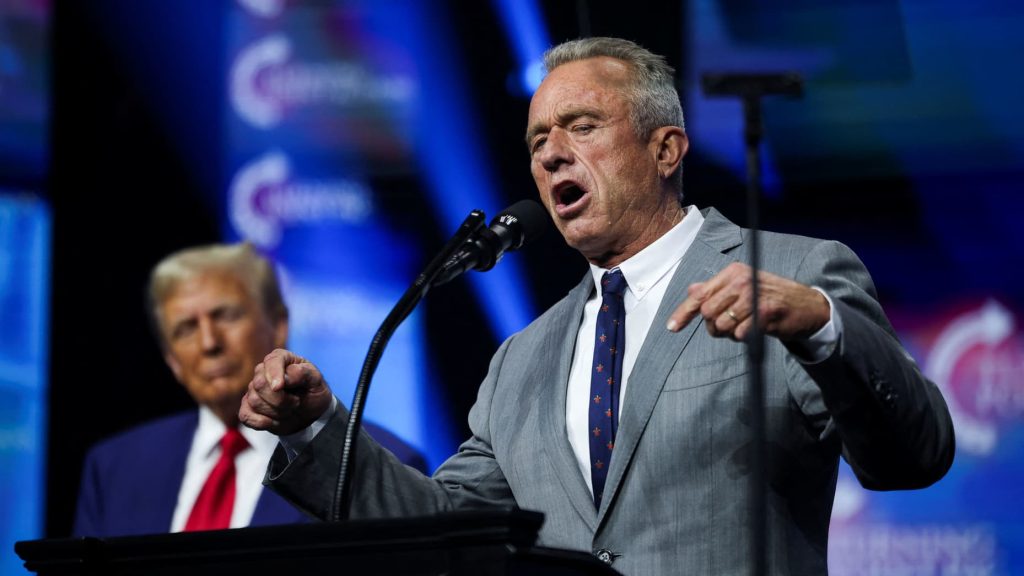Former President Donald Trump recently indicated his tentative support for Robert F. Kennedy Jr.’s controversial plan to eliminate fluoride from public water supplies during a potential second term. In an interview with NBC News, Trump remarked, “It sounds OK to me,” although he noted that he had not yet discussed the matter directly with Kennedy.
Kennedy, a prominent anti-vaccine advocate, has gained attention for his unsubstantiated claims about the dangers of fluoride, labeling it as “industrial waste” and asserting that it is linked to various health issues. During the same NBC interview, Trump mentioned that if he were to win reelection, Kennedy would play a significant role in his administration’s health policy. He described Kennedy as “very talented” and acknowledged his strong opinions on healthcare matters, including vaccines.
When asked about the possibility of banning certain vaccines, Trump stated, “I’m going to talk to him and talk to other people, and I’ll make a decision,” emphasizing Kennedy’s expertise and views. Kennedy, who has previously run for president as an independent candidate, has advocated for significant changes in public health policy, including the removal of fluoride from water systems nationwide.
In a social media post, Kennedy declared that the Trump administration would advise all U.S. water systems to remove fluoride, which he argues contributes to several medical conditions such as arthritis, thyroid disease, and developmental disorders. However, public health authorities, including the Centers for Disease Control and Prevention (CDC), recommend community water fluoridation as an effective and economical method to improve dental health among residents.
At a campaign rally in Pennsylvania, Trump reiterated his support for Kennedy’s ideas, indicating that he would give Kennedy significant latitude in addressing health-related issues. Trump stated that he would allow Kennedy to “go wild on health” and “go wild on medicines,” suggesting that he values Kennedy’s input on public health matters.
Kennedy’s claims about fluoride are controversial, with the CDC noting that fluoride naturally occurs in water and rocks. While excessive exposure to fluoride can lead to health problems, such as skeletal fluorosis, which affects bone strength, public health organizations maintain that the levels used in community water fluoridation are safe and beneficial for oral health.
Critics of Kennedy’s proposals, including some public health experts, point out that his assertions often lack scientific backing and stem from conspiracy theories about environmental chemicals. Kennedy has previously made unfounded claims linking chemicals in the environment to social issues, including assertions that they may influence sexual orientation. Such ideas have found a following among certain fringe groups, fueled by the rhetoric of conspiracy theorists.
As Trump’s campaign moves forward, the role of Kennedy in a potential administration appears to be a focal point. At a recent rally in Michigan, Trump reiterated that Kennedy would be instrumental in shaping health policy if he were to win the presidency again. This includes Kennedy’s involvement with key public health agencies like the Department of Health and Human Services and the Department of Agriculture.
Despite Kennedy’s controversial views and history of promoting conspiracy theories, Trump’s endorsement signals a willingness to embrace unconventional health policies that align with Kennedy’s ideology. The proposal to remove fluoride from public water reflects a broader trend within certain segments of the political landscape, where distrust of established scientific consensus on health matters has gained traction.
In the context of the upcoming election, Trump’s endorsement of Kennedy’s ideas may resonate with voters who share similar concerns about government recommendations on health issues. However, the implications of such a policy shift could have significant consequences for public health initiatives and community well-being across the nation.
As the campaign intensifies, both Trump and Kennedy seem poised to advocate for a health agenda that challenges traditional practices and embraces a more contentious approach to public health policy. This alignment could reshape the discourse surrounding health issues in the lead-up to the election and beyond.








